Deep Insights into the Essence of Dr Sears' Attachment Parenting
- Read about Dr Sears and his remarkable efforts on
coining the powerful parenting approach of attachment
parenting
- Get deep insights into the true essence of attachment
parenting and child centred parenting discipline.
- And as a extra special treat for those of you who are
academically hungry, follow the footprints of attachment
parenting through the course of history back to the
fascinating theoretical forefathers of attachment
parenting like John Bowlby and Carl Rogers.
Dr. Sears, the Father of Attachment Parenting
As you probably know, Dr William Sears is no new name in the
parenting arena. For nearly three decades, William Sears has
been an influential and respected voice in the area of
parenting.
Combining the theories and ideas of several
psychologists and medical doctors with his own personal
experience, Dr Sears is the founding father of the widely
recognized concept of
attachment parenting.
Very
briefly put, the ultimate long term goal of attachment
parenting is enabling children to form
secure attachments to their caregivers (typically
their parents) which results from
attachment theory research have
demonstrated are crucial to healthy emotional child
development.

In other words, the degree of parents'
sensitivity and emotional availability to their children has
been proven to play a huge role in their children's ability to
feel existentially secure - something which paves the way for
becoming healthily independent, well-rounded adults.
Although Dr Sears has faced
some criticism of attachment parenting,
attachment parenting actually draws from decades of research
conducted by renowned physicians and therapists at some of the
most distinguished medical schools or hospitals in the world.
The positive effect of secure attachment is not simply
a hypothesis, but is actually rooted in
neuroscience, showing how both the emotional and physical
development of children is affected by presence of close and
intimate relationships in their lives.
So, Who Is Doctor William Sears? Brief Information on His Medical Credentials
Dr Sears has completed residencies at both Harvard Medical
School's Children's Hospital in Boston and the Hospital for
Sick Children in Toronto, the largest children's hospital in
the world.
He is currently an associate clinical
professor of Pediatrics at the University of California,
Irvine, School of Medicine and acts, among other things, as a
medical and parenting consultant for Baby Talk Magazine.
Dr Sears has authored or
co-authored more than 30 books, including the popular 'Sears
Parenting Library' that has been offering advice to parents
for many years and giving them tools to help build strong,
trusting relationships with their children.
Below here
is a video starring Dr. Sears (in case you don't know what he
looks like) where he provides you with baby sleeping tips that
are rooted in attachment parenting.
Frustration with the Inadequacy of Traditional Parenting Strategies
Dr
William Sears and his wife Martha (a nurse) have plenty of
personal experience with children themselves as they have a
whole eight of them.

Dr Sears states that as young
parents he and his wife really desired to do what was best for
their children.
However, traditional parenting books
and theories left them feeling confused and conflicted.
While Dr Sears' medical background is impressive, he
admits that when it came to parenting, his formal training did
little to help him answer the most common questions from new mothers
e.g. how to handle a constantly crying baby.
Traditional
parenting advice along the lines 'crying it out' and rigid feeding
schedules just did not seem right to the Sears, and they couldn't
bring themselves to implement these techniques with their own
children.
Even though it may seem obvious, Dr Sears expressed
the insight that infants have very different personalities and do
not fit into a set of predetermined rules and that parenting
questions do not always have easy, precise answers.
Discovering Some of the Answers by Looking at Happy Children
Most parents want to do what is best for their children, but they
just don't always understand how.
Dr Sears was looking for an
answer as well so he searched for examples of success.
You
can look at it this way: If we would like to learn to dance, we hire
a dance instructor. If we want to improve our health we consult a
personal trainer or nutritionist. Or, if we want to develop our
business skills, we enroll in a class at the local college or school.
The point is that the best way to grow in any particular
area is to learn from those who are experienced, educated, or
familiar in that field.
So, Dr Sears understood that the
most valuable parenting information could probably be gleaned from
experienced mothers with happy children.
He interviewed
parents, sent out questionnaires addressing specific areas of
parenting, and kept careful notes as he followed the growth and
development of his young informants.
In addition, Dr Sears
also put what he discovered into practice, so he learned first hand
which ideas work and which ones don't.
Dr Sears does not
advocate any suggestions that he was not willing to work with
himself which gives him a great deal of credibility with both
parents and child care experts.
Dr William Sears Expands his Experience by Studying High Needs and Special Needs in Children
And if raising eight children isn't enough on its own, the Sears
family also draws from the experience of being blessed with both a
high-need baby daughter and a son with Down's Syndrome (read about
my own
high need baby here).
Being aware of
some the more challenging aspects of parenting has helped Dr Sears
relate more authentically to families dealing with e.g. fussy babies
or children with ADHD or autism.
Dr Sears has also worked for
several years in a Neonatal Intensive Care Unit, which has helped
him become familiar with the special needs of premature babies and
the implications this may have on both parenting approaches and
family life.
So, as you can see, attachment parenting isn't
just another theory in a world flooded with parenting information.
Nor is it simply an idea included in a list of possible
parenting techniques.
Attachment parenting was constructed
from years of observing parents and babies together, from decades of
gathering data from hundreds of families on what works and what
doesn't, and from on-the-job training with individual children who
also have individual and unique needs.
The Simple Essence of Dr Sears' Attachment Parenting Philosophy: Making Your Child Feel Good about Himself or Herself!
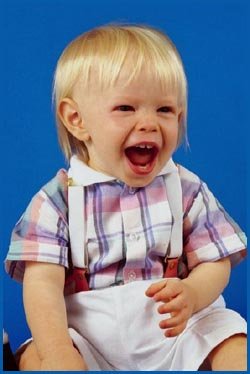 While
Dr Sears' philosophy spans an entire library of books, it can
actually be summed up quite simply: "A child who feels right
acts right and is a joy to parents" (Sears, 1999, pg. 1).
While
Dr Sears' philosophy spans an entire library of books, it can
actually be summed up quite simply: "A child who feels right
acts right and is a joy to parents" (Sears, 1999, pg. 1).
Basically, Dr Sears believes that a child's self-esteem lays the
foundation for all his or her behavior.
In other words, as
much as external circumstances may seem to control a child, it is
actually a child's perception of his 'self', or how he sees himself
that to a very high degree determines the nature of his actions.
Making sure children 'feel right' about themselves involves
creating a strong, secure attachment – connecting with your children
and being in tune with their emotions, moods, and needs.
It
means responding to your children in a way that allows them to feel
secure, safe, and free to explore the world around them.
It
means making them feel accepted for who they really are (rather than
what they are supposed to be) and loving them unconditionally.
Concepts such as 'crying it out', 'strict schedules', or 'absolute
parental control' may lead to what Dr Sears calls detached parenting.
Detached parenting is an approach where the parents largely
ignore the need signals that their child is emitting based on the
conventional idea that quick satisfaction of basic needs leads to
spoiling.
In this way detached parents are following
philosophies that are dealing with high expectations of so-called 'mature'
behavior rather than tuning in to meet the individual needs of their
child.
The Interesting Paradox of Attachment Parenting!
In short, William Sears states that every child is born with
innate needs as well as an ability to give cues about those needs.
As parents use their intuition and instinct to respond to
their children, their children learn to cue better which, in turn,
helps parents respond better. Clever, isn't it!
This is
communication in its most basic form and practicing it helps build
an open, honest relationship between parent and child.
As
mentioned, Dr Sears' philosophy of attachment parenting is both
complex and simple.
It is complex because it cannot be
reduced to a set of rules but is an 'approach' that is designed
specifically for each individual child depending on temperament and
personality.
Yet, it is also simple since it is about only
you and your child, and is based on your intuition of what is right
and best for your baby.
Dr Sears believes that although
certain principles are common, parents should be creative and
respond to needs in a manner that works for both parent and child.
Dr. Sears' Checklist of Attachment Parenting Discipline
Although approaches vary, Dr Sears believes that parents should:
Model behavior:
Whether you want to or not
you're a role model and your children will copy you.
"Do as
I say, not as I do" tend to produce confused, angry and rebellious
children.
But, if you "walk the talk", children are much
more likely to develop trust and respect.
Read more about
this in my
positive parenting article on the Mirror Effect.
 Raise
children who care about others:
Raise
children who care about others:
Children who have been
nurtured, automatically learn to be nurturing and care for others.
The logic here is that since their basic needs for care are
being met, they no longer have to focus on themselves and their
needs but can begin looking outward.
You can support your
child's education in caring for others by helping them become aware
of the effects their actions may have on others.
Build good self-esteem:
As already mentioned Dr Sears
believes that self-esteem is the foundation for future behavior so
nurturing self confidence is at the top of the list. Remember, how
the saying goes: a child who feels right, acts right.
Beware of "Baby Trainers":
A parent's primary
role is to create an environment that will help children become who
they were meant to be, but Sears believes that many parenting
techniques actually try to mold a child the way one would train a
pet.
However, needless to say children are not like robots
or computers!
Yes, you can put the information in that will
likely produce the behavior you want, but the cost of this 'conditioning'
is great, for both you and your child.
Constructing the
child you think you want rather than celebrating the child you have
been blessed with may rob him of the ability to discover
his inborn gifts and abilities.
Teach respect:
According to Dr Sears the goal is to teach children to respect your
authority but not to fear you.
Of course, if you are
modeling behavior and creating a loving and accepting environment,
your child will respect you because she wants to, not because it is
demanded of her.
Ultimately, you want your child to
understand the reason for rules so that she sees these instructions
as a way to protect her safety rather than inhibit her individuality.
Talk and listen:
Communicating with
children in a way they can easily understand is vital to healthy
child parent relationships.
Children should feel free to
express their feelings and know that parents will listen and respect
what they are experiencing without criticism or fear of punishment.
Use child-centered discipline:
The
ultimate goal is to teach children that they have choices, but also
that these choices come with consequences.
In this way,
discipline is not something that parents do to children, but rather
a consequence that comes with a particular choice.
To
encourage this, Dr Sears believes that it is important to set
reasonable expectations – do not expect children to have the thought
processes of adults or demand behavior that they are incapable of
giving.
Step into your children's shoes and try to see
things from their point of view before dealing with any behavior.
You might be surprised what a change of perspective can do for you.
- "You will find that discipline will work much better for
you once you consider your child's viewpoint in your
disciplinary actions. This does not mean that you are losing
your authority or letting your child dictate discipline; it
simply means that you respect your child's viewpoint too.
Parents who feel they have to be in constant control may have difficulty switching into "kid first" mode. Once you overcome your need to feel in control and realize that considering your child's needs in your decision making is actually part of being in charge, you will find your relationship with your child much smoother" (Sears, 1996, pg. 172).
When Dr Sears coined the phrase "attachment parenting" in the
1980s it did not come as shocking revelation.
While he was
the first to use these specific words, many of the techniques had
been practiced for years and Dr Sears largely collated the ideas of
his predecessors, building on their research and adding in his
personal experience.
Now, if you're up for it, I would like
to invite you to go with on a trip through the history of parenting
science to see how it all began.
The First Big Mistake of Parenting Science: Out ruling Mothers' Intuition!
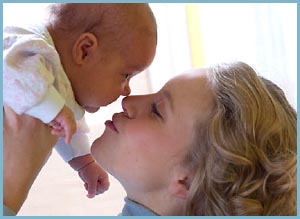 It's
no big surprise that it all actually began with mothers, way back at
the beginning of time – before psychologists, medical doctors, and "experts"
decided that mothers didn't know what they were doing and needed to
be 'guided' by professionals.
It's
no big surprise that it all actually began with mothers, way back at
the beginning of time – before psychologists, medical doctors, and "experts"
decided that mothers didn't know what they were doing and needed to
be 'guided' by professionals.
Intuition was replaced by
education, and societal expectation took precedent over a parent's
heart.
The best example of that is the parenting philosophy
presented by John B. Watson.
John B. Watson: Ignoring Individuality and Shaping Your Child to Your Desires!
Now, we can't lay the entire blame on Mr. Watson since his was
only one voice in a very large crowd; but, he is referred to as the
"Father
of Behaviorism" so it is fairly safe to say that he had
a very prominent voice in the parenting world of that time (which
was from 1913 when he introduced his Behaviorist Manifesto, all the
way until about the late 1940s).
Watson believed that too
much attachment in childhood would produce overly dependent adults
and create unrealistic expectations for the 'real world'.
To
avoid this, Watson believed that emotional detachment was the best
way to raise children: do not hug or kiss them, do not let them sit
on your lap, and whatever you do, never ever let them dictate the
schedule.
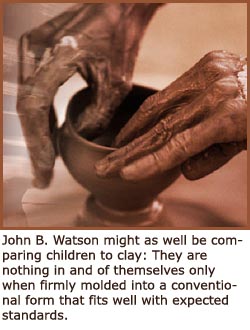 Basically,
he claimed that individual consciousness did not exist ... or
shouldn't at least. He claimed that nothing is instinctual, but that
everything is based on interaction with the external environment.
Basically,
he claimed that individual consciousness did not exist ... or
shouldn't at least. He claimed that nothing is instinctual, but that
everything is based on interaction with the external environment.
Therefore, a parent can shape a child's behavior by
controlling his environment.
In other words, by rewarding
good behavior, punishing bad behavior, and following a rigid
schedule controlled by the parents, it is possible to condition
children to become anything you want them to be. More or less like
chunk of clay!
It sounds like Dr Sears has a point when he
says that many traditional theories treated children like robots or
pets.
Anyway, Watson summed up his ideas by saying that, in
essence, children should be treated like adults.
Kind of
makes you shake your head in wonder, doesn't it? I mean, I'm an
adult, and I certainly wouldn't want to be treated according to
Watson's rules.
So even if it made sense to treat children
like adults (which it doesn't, because they aren't adults) how does
that translate into detached, unemotional, non-physical,
unaffectionate relationships?
Well, it didn't make sense to
the father of attachment theory either,
John Bowlby.
John Bowlby: The Father of Attachment Theory
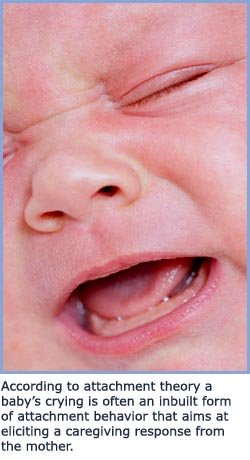 John
Bowlby had studied child psychiatry and psychoanalysis and had the
nerve to question popular theories of the day, such as those
advocated by John B. Watson.
John
Bowlby had studied child psychiatry and psychoanalysis and had the
nerve to question popular theories of the day, such as those
advocated by John B. Watson.
Today it almost seems like
common knowledge but back in the days it was groundbreaking news
when Bowlby stated that a child's psychological development could be
impacted by his relationship with his parents.
Initially,
Bowlby was ignored or criticized for his ideas particularly his "Maternal
Deprivation Hypothesis" which claimed that children who are deprived
of responsive and sensitive mothers (or primary caregivers) will
experience emotional scarring that will affect all other
relationships, even into adulthood.
Since the 1940s and
1950s was an era when hiring nannies was popular and maternal
involvement in some circles of society was minimal (e.g. in
middle/upper class Britain), you can imagine how well this
suggestion was received.
However, Bowlby was not deterred.
He began observing children in hospitals. In those days it
was common practice to limit visits, so children were often isolated
and saw very little of their parents during their stay.
Bowlby documented that children would begin to cry and protest
having to be separated from either parents or caregivers (their
source of security), and when their complaints gained no results,
they would become depressed and withdrawn.
This prompted him
to introduce
attachment theory and the idea that people have
a desire to be near those they feel attached to, and that this is
especially true in children.
The results of this research
made it difficult for the medical community to disregard the
findings, and among other things, hospital visiting policies were
changed.
About the same time, there were also a couple other
well known doctors and psychologists who were coming to the same
attachment conclusions as Bowlby.
Perhaps one of the most
recognizable is
Dr Benjamin Spock.
Dr Benjamin Spock's Radical Parenting Advice: Parents, Trust Yourselves!
Dr. Benjamin Spock absolutely shocked the parenting world when he
suggested that parents should forget the long list of rules and
'trust themselves'.
He caused further gasps when he stated
that "there is no such thing as too much love."
Well, what do you know – now parents were not only permitted to love
their children, but they were also encouraged to actually show it.
As basic as this sounds to us, based on the prevalent
theories of the time, this meant a radical and complete shift in
parenting philosophies.
And to the further horror of
committed Behaviorists, Dr Spock actually mentioned the forbidden
word: Intuition!
He stated, "What mothers and fathers
instinctively feel like doing for their babies is best overall."
Wow! Dr Spock had stumbled upon what mothers have always
known (although they were taught to forget), that parents have an
innate ability to know their child.
In fact, Benjamin Spock
built his theory on the phrase, "You know more than you think
you do".
- "We know for a fact that the natural loving care that parents give their children is a hundred times more valuable than their knowing how to pin a nappy on just right or how to make a formula expertly" (Spock, 1958, pg 15).
For his ideas, critics gave him the title "Father of
Permissiveness".
But, mothers everywhere were breathing a
sigh of relief because the previous "one-size-fits-all" parenting
was now being traded for a ''know your child and meet their needs"
philosophy.
The fact that his book has sold over 50 million
copies is a testament that parents everywhere were, and are, happy
to have an alternative to the Behaviorism methods.
Although
Spock does not mention attachment theory, similar ideas are obvious
throughout his writings, proving that he and Bowlby were making the
same discoveries almost simultaneously.
The ideas of
flexible affectionate parenting, treating children as individuals,
and building a loving, trusting child parent relationship were
becoming popular as parents began to realize that love and mutual
respect prepared their children much better for the 'real world'
than shaping them into obedient, conditioned clones.
For the
first time in a long time, parenting became about personality,
temperament, and individuality. And these concepts were incorporated
into attachment parenting, especially in the idea that parents do
not have to be perfect.
Dr Sears states that children thrive
in an attached environment, despite parents shortcomings. It is
detachment and insensitivity, not parental mistakes, that harm
children.
Carl Rogers and the Power of the Unconditional Positive Regard
Like Dr Benjamin Spock,
human therapist Carl Rogers did not (as
far as I know) specifically mention attachment theory (probably
because he was also developing his ideas around the same time
as Bowlby and Spock) but he was independently discovering many
of the same principles.
According to Carl Rogers, as an
infant interacts with the people around him, he develops a
more complex experiential field and begins to gain a
definition of "I" or "Me".
Carl Rogers called this "self-concept"
and it is actually the point where a child is able to
distinguish between what is part of himself and what is
external to himself.

In essence, self-concept is equal to self-image and
represents what a child is, should be, or would like to be. It
is important to note that how a child sees himself is
dependent on the feedback he receives from the important
people in his life.
An infant has an innate need for
'positive regard' which is acceptance, love, and approval from
the key people around him, most often his mother.
The
extent to which positive regard is given, determines how well
a child will acknowledge his natural tendency to move toward
what Rogers called "actualization or enhancement of self".
Parents often withhold positive regard because they are
unhappy with a child's behavior.
However, an infant is
unable to think like an adult and perceives disapproval of
behavior as disapproval for himself as a person. In this case,
he will stop trying to grow and develop and discover his
self-concept, but will instead strive to secure positive
regard.
Unconditional positive regard is when a
child feels like a parent's love, acceptance, and approval is
given freely and not conditional on behavior.
This
sounds a lot like attachment parenting's idea of unconditional
love, doesn't it?
Rogers also discusses what he calls
"conditions of worth". This simply means that the child
believes his self worth is connected to his behavior and that
there are conditions to the love and approval he receives.
Remember, Dr Sears also believes that self-esteem or
self-worth is the foundation for future behavior and that "a
child who feels right will act right".
If a child
believes that he deserves affection only if he expresses
desirable behavior and attitudes, then he feels that he must
earn a parent's love. This forces the child to make a choice:
be true to who they are or pretend to be who they are expected
to become.
The Unconditional Positive Regard Fuels Individuality and Allows for Full Growth
One of the things that Bowlby, Spock, Rogers, and Dr Sears all
agree on is that a child is an individual.
Everyone is
unique!
That means that children must feel free to discover
who they are and develop a self-concept that comes from the
unconditional positive regard.
Carl Rogers stated that when
conditions of worth are in place, children will feel anxiety because
they have to close themselves off from certain experiences, and this
creates an inner conflict.
He called this "incongruency",
and it occurs when there is a discrepancy between their personal
experiences and their self-concept.
Remember, self-concept
is based on how they see themselves (their self-worth) and what they
feel they need to do to achieve positive regard.
When a
child receives unconditional positive regard, there are no
conditions to worth, and they are free to use their experiences to
help achieve their full potential.
Carl Rogers was the first
person to introduce the idea of "unconditional", but this concept
has set the foundation for attachment parenting as well as Alfie
Kohn's "Unconditional Parenting"
Alfie Kohn and Loving Unconditionally with Unconditional Parenting
Like Dr Sears,
Alfie Kohn is a more contemporary proponent of
building emotional, trusting relationships between children and
their parents.
Alfie Kohn is probably best known for his
idea of "working with children rather than doing things
to them."
Like attachment parenting,
unconditional parenting states that meeting a
child's needs on an individual level is the basis for all healthy
relationships.
Children need to know that they are loved for
who they are, not what they do, and that they will be accepted even
when they fail.
Kohn argues that the weakness of Behaviorism
is the fact that it is based on a system of rewards and punishments.
Do this and you will get that.
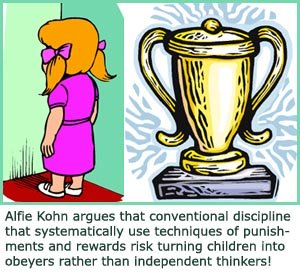 Alfie Kohn believes
that looking only at the actions we can see and measure gives us a
very limited viewpoint because it does not take into consideration
the reasons why the behavior is manifesting.
Alfie Kohn believes
that looking only at the actions we can see and measure gives us a
very limited viewpoint because it does not take into consideration
the reasons why the behavior is manifesting.
To align this
idea with Rogers' theories, you can ask:
- Is my child being good because it is in agreement with his
self-concept and because he feels unconditionally loved?
- Or, is he behaving a certain way because he is trying to earn a reward or avoid a punishment?
In other words, is it really who your child is, or simply who you
created him to be?
These are tough questions, but like Carl
Rogers, Alfie Kohn believes that if children feel that they are only
worthy of love when they impress their parents, then they will do
what is expected even if it goes against who they really are.
Alfie Kohn believes that children who are micromanaged risk
becoming unquestioning 'obeyers' rather than independent thinkers. A
child who is not allowed to think on his own may grow up to become
an adult who cannot think on his own. Simple logic!
When
forced into a decision making situation, he hasn't got the tools to
think critically and has no strong inner convictions or values –
either good or bad – because he has never learned to become his own
person.
Put very provocatively, children raised according to
Behaviorism or the
authoritarian parenting style tend to grow into
adults who struggle with sense of existential security and
individual decision making and who adhere to good values because
they fear authority rather than respect it.
On the other
hand, children raised with unconditional parenting (unconditional
positive regard, attachment parenting) are more likely to grow into
adults who are not afraid of intimate relationships, are able to
think independently, and are committed to good values and behavior
because it was modeled to them by people who love and accept them
for who they are, not what they do.
In an interview for
EducationNews.org, Kohn said:
- "Excellence comes from interest, interest comes from
freedom, and freedom comes from not having to worry about
whether failing will cause your parents to pull away."
Attachment Parenting: A Meeting of the Minds (and Intuitions)
The doctors, psychologists, and child development experts
mentioned are only a few of the many voices who have advocated, and
continue to promote, the ideas inherent in attachment parenting.
John Bowlby stated that an infant has the
desire to be close to another person and feels secure when that
person is near.
Dr Benjamin Spock suggested
that parents toss out the rules and 'trust themselves' because 'they
know more than they think they do'.
Carl Rogers'
theories advise removing conditions of worth and giving
unconditional positive regard, and Alfie Kohn says
parents should work with their children rather than doing things to
them.
And attachment parenting states that
"only you know your child" and you should rely on your
intuition when it comes to making decisions regarding your child.
Not every child is the same, not every parent is the same,
so the dynamic of every family will be different.
The key is
to create a strong emotional bond based on responsive parenting and
built on mutual respect and trust.
Thanks to Dr Sears and his
predecessors, we now understand that the best way to raise our
children is to trust ourselves and give them what they need as
individuals to become the unique person they were meant to be.
Your Positive Parenting Ally,
Birgitte

Want to stay in touch and get the latest news?
Sign up
for my free newsletter
Parent Coaching
- For Inner Peace, Clarity and a Deeper Connection to Your Child
 Being a parent can feel like a double-edged sword. Life with kids may feel like the greatest gift you have ever received, while at the same being hugely challenging, often leaving you confused, stressed and overwhelmed.
Being a parent can feel like a double-edged sword. Life with kids may feel like the greatest gift you have ever received, while at the same being hugely challenging, often leaving you confused, stressed and overwhelmed.
When we feel like this, we've lost touch with ourselves. We can't hear our own inner voice, and it's difficult to know what is 'right' for us and how to act.
I offer in-depth parent coaching to help you regain your balance and get back in touch with yourself. From a place of inner peace and clarity, your will find your own answers which will help you reconnect with your child from a place of unconditional love and acceptance.
Read more about my parent coaching here.
Where Would You Like to Go Next?
Attachment Parenting Articles
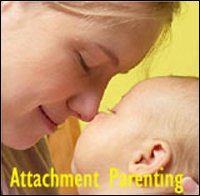 Attachment Parenting and Intuitive Parenting: Read Your Child Rather Than Some Book! |
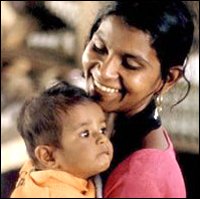 What Is Attachment Parenting? 10 Sharp Truths and 2 Common Misconceptions! |
Attachment Theory Articles (Scientific Angle)
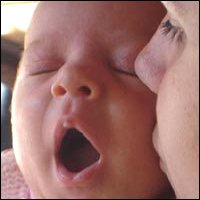 Psychology Attachment Behavior; Find out When to Expect the Constant Clinging or the Letting Go of Mom's Skirt! |
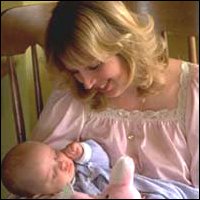 Attachment Theory is Good Basic Knowledge ... But Misses Out on Individual Infant Temperaments! |
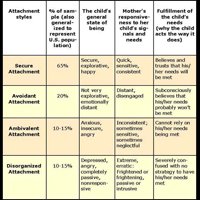 The Four Infant Attachment Styles: Straight to the Point, Quick Understanding! |
 Secure or Insecure Attachment in Infancy ... Largely Shapes Who We Are Today! |
Attachment Experts
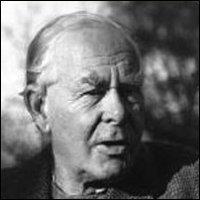 John Bowlby: The Father of Attachment Theory |
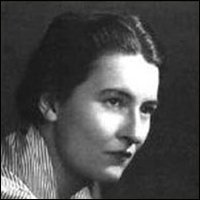 Mary Ainsworth: The Refiner of Attachment Theory |
Attachment, High Need and Separation Anxiety
 A High Need Baby: A Strong Personality Is Great, But Where's the Off Button? |
 Baby Separation Anxiety The More Your Baby Clings, the More You Let Him! 10 Tips to Ease Baby Separation Anxiety |
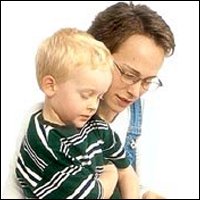 Valuable Insights into Separation Anxiety in Children and Babies: Meet Your Child with Full Acceptance and Deep Connection! |
 Facts and Fiction about the Controversial Ferber Method along with a Discussion of Its Potential Long Term Consequences |
Back to the top of this page about Deep Insights into the Essence of Dr Sears' Attachment Parenting
Go to the Positive Parenting Ally Homepage







